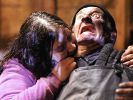Eye For Film >> Movies >> World Of The Dead: The Zombie Diaries 2 (2011) Film Review
Take the faux reportage style of The Blair Witch Project and the English zombie revivalism of 28 Days Later, throw a positively minuscule budget at it, and you get Michael Bartlett and Kevin Gates' The Zombie Diaries which, though both amateurish and undoubtedly opportunistic, earned its place in the annals of film history as the first of its kind. For while it was released in 2007, the same year as the similar (and frankly better) Diary Of The Dead and [REC], it was in fact shot back in 2005 (and only really won distribution on the back of buzz surrounding Romero's first venture into shakicam).
World Of The Dead: The Zombie Diaries can make no such claims to primacy, let alone originality. For it is a sequel, set some four months after the viral outbreak depicted in the first film, and it brings little new either to its immediate predecessor (with which it shares several characters and situations) or to a horror subgenre that has been done to death over the last half a decade. So even if World Of The Dead is competent enough, and far surpasses such forgettable undead excursions as Zombie Transfusion, Bubba's Chili Parlor and Zombie Undead, its greatest crime is its utter lack of distinction.

With most of the world overrun by virus-engendered zombies, a small group of Territorial Army soldiers has been holding out in an inland British military barracks. A nocturnal breach of the base's perimeter fence forces the surviving squaddies to flee, along with traumatised civilian Leann (Alix Wilton Regan, replacing Victoria Nalder from the original), towards Hope's Point on the east coast, where they hope (geddit) to catch the last boat to Rotterdam before Britain is left to a zombie holocaust. En route across a snowy, desolate landscape, they encounter not only hordes of braindead flesheaters, but an even more dangerous group of lawless, rape-happy bandits, two of whom – Goke (Russell Jones) and Manny (Hiram Bleetman) – had already terrorised Leann in the first film. Yet the soldiers, too, have been guilty of horrific acts in the past that they would prefer to have erased from the record.
It is hard to escape the impression that, much like its relentlessly shuffling denizens, World Of The Dead is itself just going through the motions with a dead-eyed perfunctoriness. Films like this truly are legion, and it takes more than just stock scenes of survivor dilemmas and zombie chow-downs to make a zombie flick as memorably inventive as, say, Fido, Pontypool, Colin, Zombieland or DeadHeads.
The home video 'diary' approach has long since lost its arresting sheen, and in fact hampers as much as it helps narrative authenticity. 'Embedded' immediacy is one thing, but the repeated assertions by army photographer Jonesy (Rob Oldfield) that it is important to document what is happening are hardly enough to make us believe that he would continue filming while under attack, when picking up a weapon and assisting his comrades seems far the more obvious alternative. At least the camera's night vision does serve as a useful tool for the small squadron in the darker scenes – but overall it might have been better if this film had been shot in a more conventionally 'objective' style (as its well-handled coda is).
In their commentary on the DVD release of this film, the directors suggest another, more interesting motive behind Jonesy's compulsive videorecording, to do with the expiatory erasure of footage already stored in the camera. This, however, is an idea that the film itself fails effectively to communicate, and that does not stand up to scrutiny. To this viewer, at least, it was far from clear that the occasionally glimpsed flashbacks (with their starkly different colour grading and framing) to a 'Final Solution' executed by Hazmat-suited cyphers were supposed to represent earlier recordings made on the same camera and half-preserved in digital palimpsest – and there would surely be simpler and more efficient ways for a semi-professional photographer to erase footage from the digital camera that he has been using for at least the last four months.
So while Gates' idea about the camera's footage serving as Jones' guilty conscience is a good one, it is alas conveyed so poorly by the film itself that it is unlikely even to be noticed – and amid all the merely serviceable dialogue and flat characterisation on offer here, there is no other real psychological drama to keep all the human and subhuman atrocities engaging. Gates and Bartlett set things up nicely for a second sequel, but it will probably be about as welcome as a real zombie apocalypse.
Reviewed on: 03 Aug 2011


















